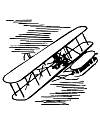 On December 17, 1903,
after many disappointments and weeks of waiting, they made the
world's first successful flight of a self-powered,
heavier-than-air flying machine. Orville was the pilot. The flight
lasted 12 seconds.
On December 17, 1903,
after many disappointments and weeks of waiting, they made the
world's first successful flight of a self-powered,
heavier-than-air flying machine. Orville was the pilot. The flight
lasted 12 seconds.These few highlights in the early life of the Wright brothers can give only a sketchy impression of those two American pioneers. Perhaps they weren't ordinary boys - although there was certainly nothing unusual about their environment. They did not have wealth, family influence nor educational advantages. To me they seemed average American boys from an average American town. But they had outstanding qualities - curiosity, persistence, an intense desire to succeed and, above all, they were self-sufficient. They were encouraged to develop themselves from within and not expect too much help from without. I believe if these young people who write us every year would take the same point of view, they could solve many of their own problems. I don't believe anyone outside should tell them they should be lawyers, doctors or engineers or ad vise them what business to get into. Suppose someone had insisted that the Wright boys get into the new automobile business - the development of the airplane might have been delayed for decades. Certainly no one, at that time, could have advised them to investigate the airplane business - there simply wasn't any. |








